THE SECOND ACT OF OSCAR “PAPA” CELESTIN
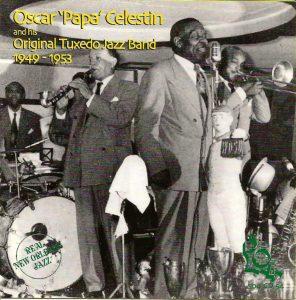 Trumpeter Oscar Celestin (1884-1954) was part of the New Orleans jazz scene as early as 1906, leading several groups with similar names (the Tuxedo Band, the Original Tuxedo Orchestra, and the Tuxedo Jazz Orchestra) from 1910 into the early 1930s, having five record dates during 1925-28. The Depression resulted in him becoming a part-time player and working during the day at a shipyard.
Trumpeter Oscar Celestin (1884-1954) was part of the New Orleans jazz scene as early as 1906, leading several groups with similar names (the Tuxedo Band, the Original Tuxedo Orchestra, and the Tuxedo Jazz Orchestra) from 1910 into the early 1930s, having five record dates during 1925-28. The Depression resulted in him becoming a part-time player and working during the day at a shipyard.
In 1946, Celestin returned to full-time music with a new version of the Original Tuxedo Jazz Band. He became a major tourist attraction in New Orleans, performing New Orleans favorites, singing almost as much as playing trumpet, and for a time featuring clarinetist Alphonse Picou (who around 1905 had created the famous clarinet solo on “High Society”). Celestin enjoyed his renaissance which climaxed in 1953 when he appeared briefly in the film Cinerama Holiday and participated in an all-star concert at the White House for President Dwight Eisenhower.
Celestin recorded a handful of selections in the studios during 1946, 1950-51, and 1954 but his discography from that era has more than doubled due to the release of some radio broadcasts and live performances by Southland, American Music, Arhoolie, and Storyville. The 504 label’s Original Tuxedo Jazz Band 1949-1953 is filled with valuable rarities that add to Celestin’s legacy.
The first 11 of the 24 selections feature Celestin’s sextet of 1949-50 with Picou, trombonist Bill Matthews, and pianist Octave Crosby. The music is spirited, lively, and fun, allowing one to forgive Celestin’s vocal on “My Josephine” (the only ballad that he regularly attempted to sing). Highlights include “Lil’ Liza Jane,” “Clarinet Marmalade,” “Saints,” and “High Society.” Three other numbers from later in 1950 have Celestin leading an entirely different band with trombonist Eddie Pierson and clarinetist Paul Barnes. The CD then jumps to 1953 and has the two selections recorded with an expanded band for Cinerama Holiday (“Tiger Rag” and “Darktown Strutters Ball”) although only “Tiger Rag” was eventually used in the film. Finally, from May 1953 are eight songs recorded to commemorate Celestin’s appearance at the White House. Leading an octet with Pierson, clarinetist Joseph Thomas, and altoist Adolphe Alexander, Celestin still sounds very much at the top of his game 19 months before his passing.
Those who enjoy Papa Celestin’s spirited brand of New Orleans jazz will certainly want the 504 release.
Original Tuxedo Jazz Band 1949-1953
(504 Records CD54, 24 selections, TT = 73:03) www.upbeatmailorder.co.uk/catalog
ALBERT NICHOLAS
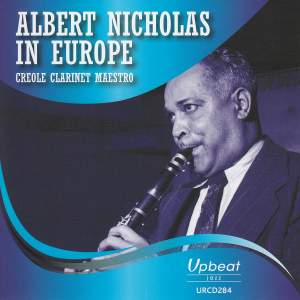 One of the finest clarinetists to emerge from New Orleans and be active in the 1920s, Albert Nicholas (1900-73) worked with King Oliver, Jelly Roll Morton, and Luis Russell among others, spending time in the 1930s with the Louis Armstrong Orchestra. He never quite achieved the fame and influence of Johnny Dodds or Sidney Bechet but he was often on their level and he had his own distinctive sound along with impressive technique. Nicholas moved permanently to Paris in 1953, a few years after Bechet, spending his final two decades working as often as he wanted. His absence from the U.S. resulted in him being underrated by many American jazz fans but he was near the top of his field during this time.
One of the finest clarinetists to emerge from New Orleans and be active in the 1920s, Albert Nicholas (1900-73) worked with King Oliver, Jelly Roll Morton, and Luis Russell among others, spending time in the 1930s with the Louis Armstrong Orchestra. He never quite achieved the fame and influence of Johnny Dodds or Sidney Bechet but he was often on their level and he had his own distinctive sound along with impressive technique. Nicholas moved permanently to Paris in 1953, a few years after Bechet, spending his final two decades working as often as he wanted. His absence from the U.S. resulted in him being underrated by many American jazz fans but he was near the top of his field during this time.
Albert Nicholas In Europe consists of three previously unreleased live performances, two from his final year. Nicholas sounds enthusiastic, fluent, and creative during a seven song set from May 28, 1972 with members of the New Iberia Stompers in England. He jams “China Boy” and “Old Fashioned Love” with the septet, is the only horn on four features (including “Rose Room”), and shares the spotlight with clarinetist Dick Cook during “Lady Be Good.” A slightly earlier session (Feb. 6, 1972) from Switzerland has Nicholas playing three standards (including “Royal Garden Blues”) with a fine quintet, and there are also four numbers from June 18, 1957 with an excellent group comprised of Polish pianist Andrzej Kurylewicz and three Germans, performed in Poland. Nicholas’ style and sound were virtually unchanged during the 15 year period covered by the CD.
There is not an excess of Albert Nicholas recordings currently available so the release of this CD is particularly welcome. Since the performances on the disc are consistently inspired and feature the clarinetist in peak form, this set is highly recommended.
Albert Nicholas In Europe
(Upbeat URCD284, 14 selections, TT = 69:27) www.upbeatmailorder.co.uk/catalog
NEW MUSIC FROM DAVE MCKENNA
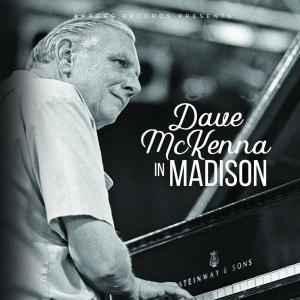 Dave McKenna (1930-2008) had a piano style that was difficult to resist. When he played hard-swinging pieces, his left hand’s urgent bass lines lifted up the bandstand. He had an admirable knowledge of American popular music and could improvise medleys comprised of related (or occasionally unrelated) songs on the spot, never losing his way or becoming hesitant. His playing was consistently joyous, even at slower tempos, and he sounded quite individual.
Dave McKenna (1930-2008) had a piano style that was difficult to resist. When he played hard-swinging pieces, his left hand’s urgent bass lines lifted up the bandstand. He had an admirable knowledge of American popular music and could improvise medleys comprised of related (or occasionally unrelated) songs on the spot, never losing his way or becoming hesitant. His playing was consistently joyous, even at slower tempos, and he sounded quite individual.
Fortunately Dave McKenna recorded a lot during 1973-2002 for Chiaroscuro, Concord, and Arbors so there is no shortage of his work on CDs. Still, it has been some time since a previously unissued session has come out, making one grateful for Arbor’s Dave McKenna In Madison.
The otherwise informative liner notes do not tell the precise date of this set but it could be from 1991 or shortly after. Performing at Farley’s House Of Pianos in Madison, Wisconsin, McKenna shows that he was very much an orchestra by himself. In addition to “Too Marvelous For Words,” Charlie Parker’s “Crazeology,” “Exactly Like You,” “Detour Ahead,” and a combination of “You’re Driving Me Crazy” and “Moten Swing,” McKenna creates three spontaneous medleys. He ties together six Vernon Duke songs (including the obscure “The Likes Of You”), makes up a medley of two different songs called “Soon” and “Rose Room,” and mixes together four tunes that have the word “Time” in their titles.
The music is well recorded and Dave McKenna is heard throughout in inventive and swinging form. This is a happy release.
Dave McKenna In Madison
(Arbors ARCD 19467, 8 selections, TT = 62:37) www.arborsrecords.com
FLOYD DOMINO’S ALL STARS
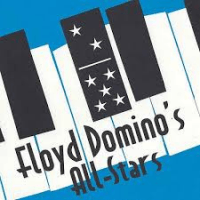 After a period of decline, small-group swing made a major comeback in the mid-1970s with the rise in prominence of tenor-saxophonist Scott Hamilton and cornetist Warren Vache. In the early 1990s, the Retro Swing movement (even with its faddish elements) gave a shot in the arm to the movement and attracted many thousands of young swing dancers. Decades later, swing is still very much alive.
After a period of decline, small-group swing made a major comeback in the mid-1970s with the rise in prominence of tenor-saxophonist Scott Hamilton and cornetist Warren Vache. In the early 1990s, the Retro Swing movement (even with its faddish elements) gave a shot in the arm to the movement and attracted many thousands of young swing dancers. Decades later, swing is still very much alive.
Pianist Floyd Domino, based in Austin, Texas, was a member of Asleep At The Wheel for seven years and has often played with Western Swing bands that combined together vintage country music with jazz. Domino’s background in swing, boogie-woogie, and blues makes him ideal for small swinging combos. His CD, Floyd Domino’s All Stars, often finds him sounding a bit like Count Basie although also displaying his own musical personality within the genre. He performs the swinging repertoire with cornetist David Jellema, tenor-saxophonist Lauryn Gould, guitarist Brooks Prumo, bassist Ryan Gould, drummer Hal Smith, and occasionally singer Emily Gimble. Their music is comprised of relaxed versions of standards, blues, and the Ray Charles hit “Mess Around.” The two horns often riff (a bit reminiscent of the Benny Goodman Sextet), the short solos add to the music’s momentum, and the ensembles are full of infectious ideas. Floyd Domino, who is well featured and occasionally showcased on selections without the horns, sounds like he is having the time of his life numbers as “Riff Blues,” “Moten Swing,” “Exactly Like You,” and “After You’ve Gone.” Listeners will have a great time, too.
Floyd Domino’s All-Stars
(Golliber Records, 13 selections, TT = 45:03) www.floyddomino.com
BOB FANELLI & THE DIXIE BOYS
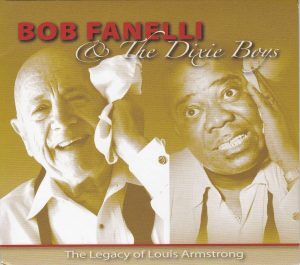 Veteran clarinetist and saxophonist Bob Fanelli pays tribute to Louis Armstrong on a CD with the Dixie Boys. The performances are not strict re-creations and there is no attempt to copy the original recordings. While there are some similarities between Fanelli’s singing and Armstrong’s voice, Roger Morgan’s trumpet solos are in his own complementary style. The group (which also includes trombonist H.L. Southall, pianist Mike Norris, banjoist Mike Byrne, bassist Bob Curl, and drummer John Rozzum) shows enthusiasm and spirit on a variety of standards. The expected hits (such as “Mack The Knife,” “Hello Dolly,” and “What A Wonderful World”) are here but so are a couple of songs not associated with Armstrong (“Caravan” and “Alabama Jubilee”).
Veteran clarinetist and saxophonist Bob Fanelli pays tribute to Louis Armstrong on a CD with the Dixie Boys. The performances are not strict re-creations and there is no attempt to copy the original recordings. While there are some similarities between Fanelli’s singing and Armstrong’s voice, Roger Morgan’s trumpet solos are in his own complementary style. The group (which also includes trombonist H.L. Southall, pianist Mike Norris, banjoist Mike Byrne, bassist Bob Curl, and drummer John Rozzum) shows enthusiasm and spirit on a variety of standards. The expected hits (such as “Mack The Knife,” “Hello Dolly,” and “What A Wonderful World”) are here but so are a couple of songs not associated with Armstrong (“Caravan” and “Alabama Jubilee”).
A fine local group, the Dixie Boys are based in the Philadelphia area. Highlights of their set include “Struttin’ With Some Barbecue” (which does a good job of introducing the musicians), “Up A Lazy River,” and “Stardust.” This would be a fun group to see live.
The Legacy Of Louis Armstrong
(Consensus Music, 12 selections, TT = 43:04) www.bobfanellimusic.com
JAZZ CLASSIC OF THE MONTH
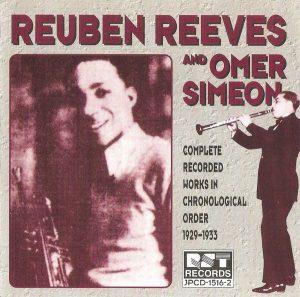 With the success of Louis Armstrong’s recordings for Okeh, several other labels in 1929 signed promising trumpeter-vocalists in the hope of equaling Armstrong’s success. Victor recorded Henry “Red” Allen and Brunswick documented Jabbo Smith while Vocalion signed Reuben “River” Reeves. Readers can be excused for greeting the latter name with “who?”
With the success of Louis Armstrong’s recordings for Okeh, several other labels in 1929 signed promising trumpeter-vocalists in the hope of equaling Armstrong’s success. Victor recorded Henry “Red” Allen and Brunswick documented Jabbo Smith while Vocalion signed Reuben “River” Reeves. Readers can be excused for greeting the latter name with “who?”
Reuben “River” Reeves played in Chicago with Erskine Tate, Dave Peyton, and Fess Williams’ Joy Boys before making his series of recordings for Vocalion. He is featured on 15 selections which, considering they are from 12 sessions, leads one to believe that his recording dates were far from productive. A rough and ready trumpeter who had a very expressive sound and took some reckless chances à la Jabbo Smith, Reeves was actually technically skilled; he just tended to get a little carried away now and then. His Tributaries (also called his River Boys) included his brother trombonist Gerald Reeves, the great clarinetist Omer Simeon, pianist Jimmy Prince, guitarist Cecil White, and drummer Jasper Taylor on the earlier titles. Other musicians including altoist Darnell Howard and Harry Gray on tuba are on some of the later sessions with a larger group. Several vocalists of varying quality also make appearances with Blanche Calloway (Cab’s older sister) faring best on “Black And Blue” and “Have You Ever Felt That Way.”
All 15 selections, which include “River Blues,” “Papa ‘Skag’ Stomp,” “Bugle Call Blues,” “Gotta Feelin’ For You,” and “Moanin’ Low,” are on a definitive CD from the Austrian RST label. Also on the set are the two selections that Omer Simeon recorded as a leader in 1929 (with Earl Hines on piano), four songs from the Dixie Rhythm Kings (a septet without Reeves that also features Simeon), and the only other session that Reeves led, a four-song big band date from 1933.
Reuben “River” Reeves spent a year with Cab Calloway’s orchestra, led his own band in Chicago during 1933-35, freelanced in New York, and was still playing on a part-time basis up until his death in 1955. His solos are often exciting and, even if his recordings did not reach the heights (or the sales figures) of those of Red Allen and Jabbo Smith, much less Louis Armstrong, he deserves to be heard.
Reuben Reeves & Omer Simeon
(RST Records, 25 selections, TT = 77:01)
In every issue of the Syncopated Times, Nights At The Turntable features reviews of CDs by classic jazz, 1920s and ‘30s, New Orleans Jazz, Swing and Dixieland artists, covering both vintage greats and some of today’s top musicians. Be sure to send a copy of your CDs to Scott Yanow, P.O. Box 1220, Lake Hughes, CA 93532 if you wish to have your recordings reviewed. If you are a musician and need liner notes, bios, or press releases, feel free to drop me a line at scottyanowjazz@yahoo.com.
Where we can link directly to an artist, publisher, or record label when mentioning an item we do so. For items where this is not possible, we link to Amazon. “As an Amazon Associate we earn from qualifying purchases.”
Since 1975 Scott Yanow has been a regular reviewer of albums in many jazz styles. He has written for many jazz and arts magazines, including JazzTimes, Jazziz, Down Beat, Cadence, CODA, and the Los Angeles Jazz Scene, and was the jazz editor for Record Review. He has written an in-depth biography on Dizzy Gillespie for AllMusic.com. He has authored 11 books on jazz, over 900 liner notes for CDs and over 20,000 reviews of jazz recordings.
Yanow was a contributor to and co-editor of the third edition of the All Music Guide to Jazz. He continues to write for Downbeat, Jazziz, the Los Angeles Jazz Scene, the Jazz Rag, the New York City Jazz Record and other publications.





















